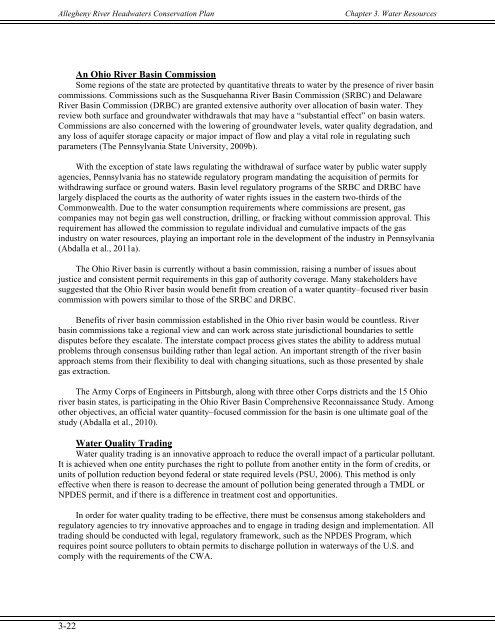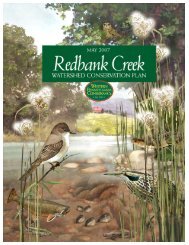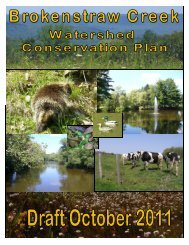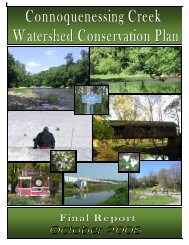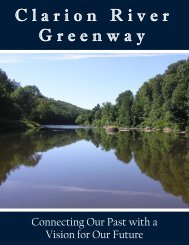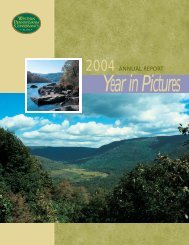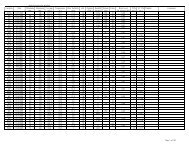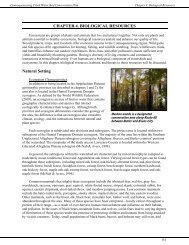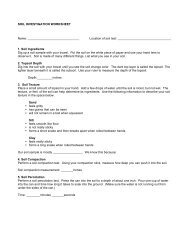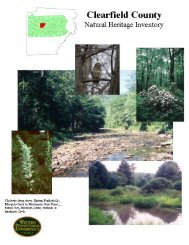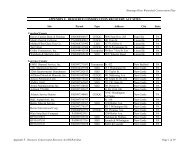Allegheny River Headwaters Watershed Conservation Plan
Allegheny River Headwaters Watershed Conservation Plan
Allegheny River Headwaters Watershed Conservation Plan
Create successful ePaper yourself
Turn your PDF publications into a flip-book with our unique Google optimized e-Paper software.
<strong>Allegheny</strong> <strong>River</strong> <strong>Headwaters</strong> <strong>Conservation</strong> <strong>Plan</strong><br />
Chapter 3. Water Resources<br />
An Ohio <strong>River</strong> Basin Commission<br />
Some regions of the state are protected by quantitative threats to water by the presence of river basin<br />
commissions. Commissions such as the Susquehanna <strong>River</strong> Basin Commission (SRBC) and Delaware<br />
<strong>River</strong> Basin Commission (DRBC) are granted extensive authority over allocation of basin water. They<br />
review both surface and groundwater withdrawals that may have a “substantial effect” on basin waters.<br />
Commissions are also concerned with the lowering of groundwater levels, water quality degradation, and<br />
any loss of aquifer storage capacity or major impact of flow and play a vital role in regulating such<br />
parameters (The Pennsylvania State University, 2009b).<br />
With the exception of state laws regulating the withdrawal of surface water by public water supply<br />
agencies, Pennsylvania has no statewide regulatory program mandating the acquisition of permits for<br />
withdrawing surface or ground waters. Basin level regulatory programs of the SRBC and DRBC have<br />
largely displaced the courts as the authority of water rights issues in the eastern two-thirds of the<br />
Commonwealth. Due to the water consumption requirements where commissions are present, gas<br />
companies may not begin gas well construction, drilling, or fracking without commission approval. This<br />
requirement has allowed the commission to regulate individual and cumulative impacts of the gas<br />
industry on water resources, playing an important role in the development of the industry in Pennsylvania<br />
(Abdalla et al., 2011a).<br />
The Ohio <strong>River</strong> basin is currently without a basin commission, raising a number of issues about<br />
justice and consistent permit requirements in this gap of authority coverage. Many stakeholders have<br />
suggested that the Ohio <strong>River</strong> basin would benefit from creation of a water quantity–focused river basin<br />
commission with powers similar to those of the SRBC and DRBC.<br />
Benefits of river basin commission established in the Ohio river basin would be countless. <strong>River</strong><br />
basin commissions take a regional view and can work across state jurisdictional boundaries to settle<br />
disputes before they escalate. The interstate compact process gives states the ability to address mutual<br />
problems through consensus building rather than legal action. An important strength of the river basin<br />
approach stems from their flexibility to deal with changing situations, such as those presented by shale<br />
gas extraction.<br />
The Army Corps of Engineers in Pittsburgh, along with three other Corps districts and the 15 Ohio<br />
river basin states, is participating in the Ohio <strong>River</strong> Basin Comprehensive Reconnaissance Study. Among<br />
other objectives, an official water quantity–focused commission for the basin is one ultimate goal of the<br />
study (Abdalla et al., 2010).<br />
Water Quality Trading<br />
Water quality trading is an innovative approach to reduce the overall impact of a particular pollutant.<br />
It is achieved when one entity purchases the right to pollute from another entity in the form of credits, or<br />
units of pollution reduction beyond federal or state required levels (PSU, 2006). This method is only<br />
effective when there is reason to decrease the amount of pollution being generated through a TMDL or<br />
NPDES permit, and if there is a difference in treatment cost and opportunities.<br />
In order for water quality trading to be effective, there must be consensus among stakeholders and<br />
regulatory agencies to try innovative approaches and to engage in trading design and implementation. All<br />
trading should be conducted with legal, regulatory framework, such as the NPDES Program, which<br />
requires point source polluters to obtain permits to discharge pollution in waterways of the U.S. and<br />
comply with the requirements of the CWA.<br />
3-22


